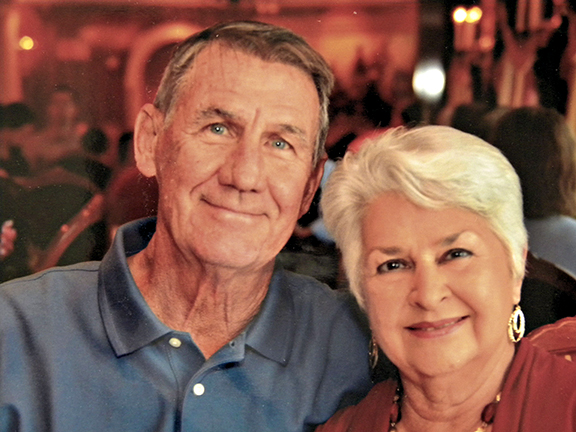Jack and Gail Parker don’t give to Suncoast Hospice to save money on their taxes.
When the tax laws changed and it made more sense for them not to itemize deductions, they sought out an alternative that would allow them to continue giving and saving money on their taxes at the same time. That’s when they began giving their annual gift to Suncoast Hospice Foundation from the Required Minimum Distribution (RMD) from Jack’s IRA.
According to the IRS, the RMD is the minimum amount an IRA-holder must begin withdrawing annually beginning at age 70 1/2. In most cases, that withdrawal is then considered part of the taxpayer’s taxable income. Parker said they realized quickly that they could donate a portion of the RMD directly from his IRA to charity and avoid a portion of the tax liability.
“Giving donations directly from my RMD saves me tax-wise and doesn’t affect my social security as much, and because of that it has a ripple effect,” Parker said. “Giving this way is one of the few things we can do to minimize our tax liability.”
 Jack and Gail give in honor of Jack’s first wife Jane who was instrumental in starting the Perinatal Doula loss program at Suncoast Hospice. The program provides specially-trained doulas who help parents through the death of pre-term or stillborn babies.
Jack and Gail give in honor of Jack’s first wife Jane who was instrumental in starting the Perinatal Doula loss program at Suncoast Hospice. The program provides specially-trained doulas who help parents through the death of pre-term or stillborn babies.
Tim Eitel found a similar solution that allows him to give to his favorite charities, including Suncoast Hospice, while saving on his tax bill. His decision to donate appreciated stock was an easy one. “I have stock I acquired through stock options over my 35-year career with Raymond James,” he said. “Because of the age of the stock, it is highly appreciated and I receive the tax deduction on the appreciated value.” In addition, Eitel avoids paying capital gains tax on the highly-appreciated stock because he doesn’t sell it for cash. Instead, he has his broker send it directly to Suncoast Hospice Foundation where it is sold. The resulting cash is then used directly for the care of hospice patients and families.
In a November 26, 2018 Forbes online article, author Bruce Bomberg wrote, “Given the changes in the rules for itemized deductions under the Tax Cuts & Jobs Act (TCJA), stock donations can reduce your taxes by giving you total deductions that exceed your new increased standard deduction amount.”
Eitel said, for him, giving appreciated stock makes a lot of sense economically, and giving to Suncoast Hospice is something he would encourage everyone to do. “They’ve been absolutely amazing to the friends and family that have had the need. They have a heart; they’re caring, and it’s an absolutely wonderful organization that does so much for the community,” he said.
David Wakely wasn’t looking for a new way to give, but when his son told him about the benefits of using a donor-advised fund (DAF), it made perfect sense. Wakely and his late wife Fran were lifelong community supporters of several charities. Fran was in the care of Suncoast Hospice for the last year of her life, and because of the quality of the care she received, David made the decision to add Suncoast Hospice to their list of supported charities. He said he gives through his DAF because it allows him to give more in years when his tax burden is higher.
The IRS defines a donor-advised fund as “a separately-identified fund or account that is maintained and operated by a section 501(c)(3) organization, which is called a sponsoring organization.” Some examples of these organizations are Fidelity Charitable Trust, Raymond James Charitable and the Community Foundation of Tampa Bay. The donor establishes the fund, and then makes contributions to it for later designation to favorite charities. Since the DAF is an IRS-recognized charity, the donor receives the tax deduction in the year the contribution is made to it. The ensuing donor-designated gifts to charities can be made in any year and are not tax-deductible at that time.
“The DAF is a tax-advantaged way to make your donations in that you can time the donation to suit your tax situation,” Wakely said. For example, if you have a capital-gains-heavy year, you can make higher gifts to your DAF with the result of an increased charitable deduction. Conversely, in a year when you have lower tax liability you may choose not to make a donation at all. This is called “bunching.”
Wakely said he chose to establish his DAF through the brokerage that already holds his investments, but there are a plethora of companies out there. Most community foundations are also an option. “Using a DAF allows you to still fund your charities annually, but to take the tax deduction at a time when it is most convenient for your tax and personal situations,” Wakely said.
For information on making a donation to Suncoast Hospice Foundation using any of the above-mentioned giving vehicles call Annette Carter, Director of Philanthropy at (727) 523-3414.
Give Monthly
For those who prefer to spread their donations out over the course of the year, becoming a member of Suncoast Hospice’s Monthly Giving Program is a great option. Gifts are deducted automatically on the 15th of each month from the donor’s checking account or credit/debit card, providing ease and convenience. To learn more or enroll in the Monthly Giving Program call Suncoast Hospice Foundation at (727) 523-2441.
Employee Matching Programs
If you like the idea of increasing the impact of your gift, your employer’s matching gift program, just might be the answer. Matching gift programs match a percentage of the charitable gifts made by employees. The amount of the match is different at each company, and there may be restrictions on the type of charitable gifts that will be matched. For example, if a donor makes a gift of $100 to Suncoast Hospice and the employer’s matching gift program matches at 50%, the gift is now $150. Most matching gift program information is available through your employer’s Human Resources Department, and is usually as simple as completing an online form. On the other hand, the impact to Suncoast Hospice patients is priceless.
Planned Giving
And finally, making a designation for Suncoast Hospice in your will or estate plans ensures that your dedication to the work of Suncoast Hospice and Empath Health continues for many years to come. In addition to a typical bequest, there are other opportunities that provide the donor and/or his/her heirs with a tax benefit or lifetime income. Other opportunities allow the donor to designate Suncoast Hospice as the beneficiary of an IRA or life insurance plan. For more information on the benefits of remembering Suncoast Hospice in your estate plans, contact Karen Van de Putte, Director of Planned Giving at (727) 523-3422.
Authored by: Annette Carter, MSNPA, CNP, Director of Philanthropy

